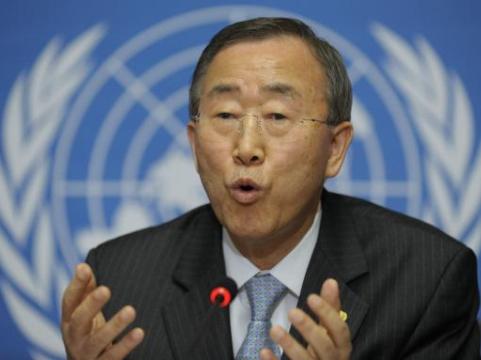Tensions rise over Azeri military officer`s release

UN hopes Karabakh talks will continue
UN Secretary General Ban Ki-moon hopes that tensions between Armenia and Azerbaijan over the pardoning of Azerbaijani officer Ramil Safarov -- who was transferred to his home country after being jailed for killing an Armenian officer in Hungary in 2004 -- will not affect the settlement of the Nagorno-Karabakh conflict, his spokesman, Martin Nesirky, was quoted by Russian RIA Novosti news agency as saying last week.
Relations between Armenia and Azerbaijan, which have been at odds since fighting a bitter war in the early 1990s over the Azerbaijani region of Nagorno-Karabakh, have been aggravated by the extradition and subsequent pardoning of Ramil Safarov.
``We hope that this issue will not damage the Nagorno-Karabakh peace process and trust between the sides. There is no alternative to a peaceful settlement of the Nagorno-Karabakh conflict,`` the spokesman said.
Ramil Safarov had been serving a life sentence pronounced by a Budapest court without the right to a parole for 30 years. On August 31, Hungary extradited Safarov to Azerbaijan, where he was pardoned by President Ilham Aliyev.
``The UN underscores the responsibility of member states to adhere to international standards and principles of rule of law in criminal cases in order to ensure accountability and fight impunity,`` Nesirky said.
Sporadic firefights have intensified along the front line around Nagorno-Karabakh, a mountainous Azerbaijani region in the South Caucasus occupied by Armenia since a war in the early 1990s that killed about 30,000 people.
Azerbaijan has repeatedly warned it would take the region back and its decision to give a hero`s welcome to Ramil Safarov has highlighted the risk of a war that could draw in Turkey, Russia and Iran.
When the ethnic Armenian majority in Nagorno-Karabakh declared independence as the Soviet Union collapsed, and invaded more Azeri territory outside the region than within it, Armenia avoided direct war with Azerbaijan. It now says it would not stand aside if the rebel region it helped establish was attacked, Reuters reported.
Both it and Azerbaijan have more powerful weapons than two decades ago and if pipelines taking Azeri oil and gas to Europe via Turkey or Armenia`s nuclear power station were threatened, war could spread.
Armenia has a collective security agreement with its regional ally Russia, while Azerbaijan has one with Turkey, itself a member of NATO for which an attack on one member state is an attack on all 28.
U.S. Secretary of State Hillary Clinton warned of a ``much broader conflict`` when she visited Armenia in June and NATO Secretary General Anders Fogh Rasmussen said on Friday he was ``deeply concerned`` by the Azeri soldier`s pardon last month.
Uphill battle
Political and military analysts say war is not inevitable, and that the potential for destruction and a regional war serve as a deterrent. But they are increasingly discussing how a conflict between Armenia and Azerbaijan might play out.
The most likely trigger is seen as a particularly deadly skirmish on the line of contact between Azerbaijani and Armenian forces. Nine people died in clashes in June.
``At some moment the crossfire will not be limited to the use of small weapons. One side will hit the other with heavy weapons,`` said Rasim Musabayov, an independent member of parliament in Azerbaijan`s capital, Baku.
``Then you can see a scenario in which the other side responds with air power and then it all goes from there.``
Less likely would be a political decision to go to war - despite Azerbaijan`s warning to regain control of Nagorno-Karabakh - or a pre-emptive strike by Armenia if an attack by Azerbaijan seemed imminent.
Azerbaijan`s annual defence spending is more than Armenia`s entire budget, but Armenia has warned of an ``asymmetrical`` response to any attack.
Abbas Aliyev, 66, was forced out of Fuzuli as it was seized by Armenian troops and settled with his wife and four children in the cramped basement of an apartment block in Baku where one toilet is shared by 16 families.
He is one of hundreds of thousands of refugees, who cannot return home until the conflict is resolved. ``I want to breathe the fresh air of my region again,`` he said.
Thomas de Waal, a Caucasus expert at the Carnegie Endowment for International Peace in Washington, said a war now would be much more destructive than the low-tech conflict of the 1990s.
``It would be much more bloody and become a full state-state conflict with unpredictable consequences.``
Obvious targets in Azerbaijan would be the Baku-Tbilisi-Erzurum (BTE) natural gas pipeline and the Baku-Tbilisi-Ceyhan (BTC) crude oil pipeline. Both are in northwest Azerbaijan, within range of Armenian forces, and have a role in Europe`s attempts to reduce its reliance on Russia for energy supplies.
A consortium of Western oil companies operates the Azeri, Chirag and Guneshli oilfields in the Azeri sector of the Caspian Sea, as well as Azerbaijan`s large Shah Deniz gas field.
Led by British Petroleum and including Norway`s Statoil and two U.S. companies, Chevron and ExxonMobil, it has plenty to lose if war breaks out.
Each side can hit the other`s capital, and Armenia`s, Yerevan, is only 30 km (19 km) from its Metsamor nuclear power plant. Northwest Azerbaijan contains a water reservoir and power station as well as an international highway and railway.
Here we are to serve you with news right now. It does not cost much, but worth your attention.
Choose to support open, independent, quality journalism and subscribe on a monthly basis.
By subscribing to our online newspaper, you can have full digital access to all news, analysis, and much more.
You can also follow AzerNEWS on Twitter @AzerNewsAz or Facebook @AzerNewsNewspaper
Thank you!
